Yes, already.
We just celebrated the Feast of the Presentation of Christ in the Temple – a “flashback” to Christmas and Christ as an infant. However, the Troparion of the Feast concludes like this: “Rejoice, O righteous Elder; you received in your arms the Redeemer of our souls, Who grants us the Resurrection.” And with that, we turn away from Christ’s Birth, and begin to move towards His Death and Resurrection.
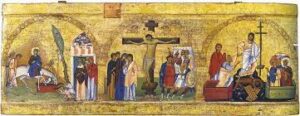
The First Three Sundays of Pre-Lent
As I wrote a couple of weeks ago, almost all good things require planning. Even if we didn’t plan them ourselves, somebody else did. In this case the Church Fathers provided us with four Sundays – we’ll talk about the Fourth Sunday later – to tell us how to keep the Great Fast. To sum up, the purpose of Lent is not so we can give up a few things. Lent is “spring training” to strengthen us in living a good Christian life all year long, and continue to progress in our life in Christ till we come to the Kingdom of Heaven.
Please read the appointed Scripture lessons as we go along.
First Sunday of Pre-Lent
Epistle: 2 Timothy 3:10-15
Never give up. Honor your teachers. Know the Holy Scriptures.
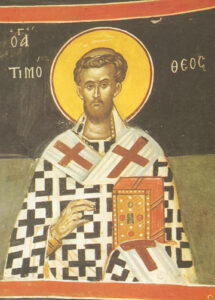
Paul tells young Bishop Timothy that all Christians will encounter difficulties, even persecution. Therefore vow now to “continue in what you have learned and have firmly believed, knowing from whom you learned it and how from childhood you have been acquainted with the sacred writings * which are able to instruct you for salvation through faith in Christ Jesus.”
- He was referring to the Old Testament. The New Testament was just then being written – much of it by Paul himself, though he didn’t know it. He thought he was just writing letters.
Already in the mid-First Century, Timothy was a third generation Christian. Paul mentions elsewhere that he had learned the Faith from his grandmother Lois and his mother Eunice. (God bless mothers and grandmothers who by word and example establish their children in the Faith. Fathers and grandfathers, too.)
Remember the good people from whom you learned the Christian Faith. Your parents, teachers, friends, pastors. I, as a pastor, have learned so much from faithful, devout laypeople. Don’t abandon them or the Treasure they shared with you – and pray for them every day.
During Lent, concentrate on the Holy Scriptures. We have a wonderful advantage which people in the ancient world did not: easy access to the Bible, this treasure house of wisdom, whether in old-fashioned books (remember them?) or now on-line. During Lent the Church’s daily lectionary takes us through the Old Testament: Genesis, Proverbs and Isaiah. However, if you’re not well acquainted with the Gospels, I’d say start there, one chapter or even one paragraph a day. How can you follow Christ if you don’t know what He told us to do?
Gospel: Luke 18:10-14: The Parable of the Publican and the Pharisee
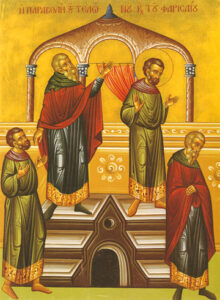
I’m sure you know that “Publican” is an old word for “tax collector”.
What else do we need to have a good Lent, a good life? Humility. We’ve all got a long way to grow before we become the people God intends us to be. Pride make us self-satisfied with what we are now.
Why in the world did Jesus use a crooked tax collector as the good guy here? and the most admired religious man, a Pharisee, as an example of what displeases God?
Let’s begin here: Jesus said the Pharisee was “praying with himself”. He wasn’t praying to God. He was telling himself: “Lord, I thank You that I’m better than that rotten tax collector over there.” That’s pride.
Now, objectively speaking, the Pharisee was the better man. Pharisees were the very best religious people. They fasted twice a week just as we do, only on different days. He tithed of his possessions, as we should if we know what’s good for us. Pharisees even went beyond the Law and tithed on their cooking herbs. If he was one of us Orthodox, he would have appeared to keep a good Lent. A good man? Yes. But a perfect man, a man totally dedicated to God 24/7/365? No. He was far from it, as we all are. He was unacceptable to God because his working principle was “Well, at least I’m better than him.” He’ll never get better that way. In fact it’s dangerous. Probably he’ll keep lowering his standards, and he’ll get worse.
Meanwhile, the Publican was a rat, and he knew it. Publicans collected taxes for the Roman oppressor, and also oppressed the poor themselves, squeezing as much money out of them as they could, while rich people bribed them to get out of paying their taxes. (Does this sound vaguely familiar?) Thus the Publicans got rich. Everyone despised them. Remember, one of the complaints against Jesus was that he ate with tax collectors. This Publican, however. felt guilty about it, was afraid to even lift up his face to Heaven. He only muttered “Lord, have mercy on me, a sinner”. (That’s the origin of the Jesus Prayer: “Lord [Jesus Christ, Son of God], have mercy on me, a sinner.”
The Publican’s working principle was “Lord, have mercy. Help me, Lord.” Thus there was hope for him. What pleases God is not what we are now, but rather that we want to become better.
So here are two Moral Principles:
1 We tend to become like those we look down on. Who do you look down on? Who do you spend your time despising? That’s what you may turn into if you keep it up.
2 We tend to become like those we look up to. So keep your eyes fixed high, on the saints – and ‘way high, on our Lord Jesus Christ, and try to follow Him. That’s what Lent is all about. That’s what the Christian life is all about – so that in the End, as Saint John wrote, “We shall be like Him.”
Second Sunday of Pre-Lent
1 Corinthians 6:12-20: “All things are lawful” but “not all things are helpful”.
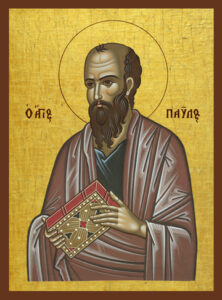
The Church Fathers gave us this reading so we will not misunderstand Fasting.
Does the Church have fasting laws, which are a sin to break? No, we do not. “All things are lawful to us”.
However, fasting is “helpful”, so the Orthodox Church offers us fasting rules: rules to guide us, rules for each of us to follow as best we can under our own circumstances. A healthy Orthodox person can probably follow the whole Lenten Rule: no meat, no milk or milk by-products, no wine *, no oil * – easing up the Fast on weekends. However, a pregnant woman or someone who is sick or old, for three examples, should adapt the rules without feeling guilty.
- Does this mean no beer? a fast from all oil or only olive oil? Nobody knows. You decide.
Then Paul points out that things can enslave us, if we let them, even things which are not wicked in and of themselves can enslave us. Like chocolate, if it’s sitting there in the cabinet, as it does now, forever calling to me, “Come. Eat.” And if I have a piece, it calls again… and again… That is a good reason for me to prove it doesn’t control me, by giving it up for a while. Like during Lent.
But then Paul goes on to make a much more important point about what we should definitely always give up: sexual immorality. (Remember, he was writing to the Christians in Corinth, which was a big party town. Guys would say “I’m going Corinthing”, which meant… well, you know.) He says that sexual union creates spiritual union – whether the partners know it or not, it just does. (I believe that is one reason why our modern culture is so torn apart and disoriented.) Our bodies, as well as our souls, are members of Christ, part of Christ’s Body, His Holy Church. We do not belong to ourselves. We belong to Jesus Christ.
However, what Paul says here about sex should be kept in context of many other sins (behaviors which are “off the mark”). In his letter to the Galatians he lists a bunch of them. By works of “the flesh”, he means of “fallen human nature”:
“Now the works of the flesh are evident, which are: adultery, fornication, uncleanness, lewdness, idolatry, sorcery, hatred, contentions, jealousies, outbursts of wrath, selfish ambitions, dissensions, heresies, envy, murders, drunkenness, revelries, and the like; of which I tell you beforehand, just as I also told you in time past, that those who practice such things will not inherit the kingdom of God.” Galatians 5:19-21 (Read on. Later he lists the positive “works of the Spirit”.)
Luke 15:11-32: The Parable of the Prodigal Don
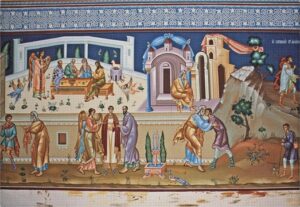
This one is simple:
1 Do not be like the Prodigal Son. God has given you an inheritance: God has destined you to inherit the joy of eternal life. Don’t throw it away.
2 On the other hand, be like the Prodigal Son. The Prodigal Son is mankind. He is also me. In many ways we all have turned away from God. So when we do that and find ourselves wallowing in the mire, eating pigs’ food, so to speak, return to God who loves us. Going to Confession is a good way to do this.
3 Be like the Father, who is God, of course. God is full of love and generosity and magnanimity, who swallows His pride and welcomes us home, no matter what. Even before we can say we’re sorry, we know we will be forgiven. Don’t you see? He has already run out to welcome us and forgive us – when Jesus Christ came to earth , “though we were still sinners”. We should be like the Father: Whoever we are not willing to forgive… forgive. We’ll talk more about this on Forgiveness Sunday.
4 Do not be like the Elder Brother. Had he been faithful while his brother was squandering his inheritance on loose living? Yes. That’s his complaint, and a just one: “So why do you throw a party for him but not for me?” – and he won’t even go to the party. You see the problem? God’s Kingdom is not about justice; it’s about mercy and forgiveness. The elder brother won’t forgive, and in his pride, he’s missing the party, the Great Banquet in the Kingdom of Heaven. So now who has become the prodigal son?
Third Sunday of Pre-Lent
Epistle: I Corinthians 8:8 – 9:2: “Food does not commend us to God.”
With all our emphasis on Lenten fasting, why ever do you suppose the Church Fathers chose this Epistle for today? in which Saint Paul says, “Food does not commend us to God”. God isn’t impressed whether we eat or don’t eat – hardly designed to encourage us to fast!
The explanation. Most of our Orthodox lectionary was fixed by the Fathers at a time when almost everybody fasted.
 Fact is that almost everywhere in the world at every time in every culture in every religion, people have practiced religious fasting. Only in modern times in our culture do most people think fasting for religious reasons is just silly. For physical health, yes. For spiritual health, no way.
Fact is that almost everywhere in the world at every time in every culture in every religion, people have practiced religious fasting. Only in modern times in our culture do most people think fasting for religious reasons is just silly. For physical health, yes. For spiritual health, no way.
How very odd. In recent times we have learned again to think holistically, to see the inter-connectedness of soul, mind and body. So why do so few people not see the connection between spiritual health and what we do with our bodies – regarding fasting, and other far more important things such as sexual morality, as Saint Paul made clear last Sunday. But that’s our modern world: disjointed and inconsistent.
Anyway, today’s Epistle was directed at Orthodox people who were tempted to over-emphasize fasting. The Fathers’ purpose was to point out the dangers in fasting, of thinking that if we fast that’s all we need to do for Lent, that God will somehow be impressed: “Wow!” He will say, “He didn’t eat that bratwurst! What a holy person he/she is!” I don’t think so. They are warning us that fasting from food alone does not make for a good Lent. In fact fasting from food without fasting from sin will make a dangerous Lent. We’ll hear from Saint John Chrysostom about this in two weeks.
Matthew 25:31-46: The Last Judgment
“When the Son of Man gathers all nations before him He will separate them as a shepherd separates sheep from goats.” It will be the time for the Final Judgment.
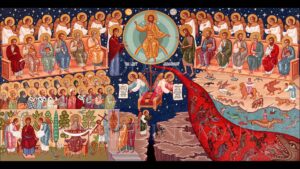
Thank God there will be judgment. Do we want the world to go on like this forever? where evildoers so often get away with it? where good people are oppressed, persecuted, suffer and die?
Saint Basil’s Divine Liturgy, which we use on Lenten Sundays, tells us “He will come to render to each according to his works.” Christ was very clear about this. (Don’t tell the Reformation Protestants!) How we act now will have eternal consequences.
Christ taught that in the End there will be only two options: Heaven or hell. There is a Kingdom prepared for the sheep of His flock, with abundant unending life, fresh pastures, eternal spring, joy with the Lord and all who love Him. As for the rebellious goats: “Depart into the everlasting fire prepared for the devil and his angels”.
 Eleven times in the Gospels, Christ warned of the fire of “Gehenna”. He was referring to the the valley of Gehinnon below Jerusalem (see the red oval) – then the city garbage dump, from which smoke was always rising as the refuse was destroyed. Hell is the eternal garbage dump for those who proved finally to be not worth saving. That, in the most basic sense, is what “being saved” means: “not being thrown out” in the Final Housecleaning. In the End, for each of us, it will be either eternal Joy above in the Holy City with Jesus, or unending destruction down below.
Eleven times in the Gospels, Christ warned of the fire of “Gehenna”. He was referring to the the valley of Gehinnon below Jerusalem (see the red oval) – then the city garbage dump, from which smoke was always rising as the refuse was destroyed. Hell is the eternal garbage dump for those who proved finally to be not worth saving. That, in the most basic sense, is what “being saved” means: “not being thrown out” in the Final Housecleaning. In the End, for each of us, it will be either eternal Joy above in the Holy City with Jesus, or unending destruction down below.
We must believe in the existence of Hell. Christ taught it plainly many times. But, as someone said, we are not required to believe anybody is in it! It is hard to imagine how anyone could finally stand before Jesus Christ, look God in the face, see His beauty, His love, His mercy, His goodness – and reject Him. Saint Gregory of Nyssa hoped that in the end everyone, even the devil and his angels, may be redeemed. I like that. But I think the Scriptures teach that while Satan could be redeemed, he won’t be. He will reject it. He already has.
God doesn’t force Heaven on us. Where we finally end up is our choice. We are deciding now, and at the End Jesus Christ who knows all, who sees into the hearts of all, will know whether we chose right or wrong. C.S. Lewis wrote (in The Great Divorce) that in the End either we will say to God, “Thy will be done”, or He will reluctantly say to us, “Your will be done. If you don’t want Me, you needn’t have Me.”
Jesus Christ will be the Judge of it all. This is His consistent teaching: John 5:22-27, for example. And here is the ultimate standard of judgment: “If you did it to the least of these my brethren, you did it to me..… If you failed to do it to the least of these my brethren, you failed to do it to me.” The sick, the lonely, the poor, the helpless, the hopeless, the abandoned ones, refugees, children of refugees, so many people near to us and far, so many kinds of needs. No one of us can meet everybody’s needs, and we should feel guilty about that. But we should do what we can. Perhaps some need only a kind word or a smile. Note that the judgment on the wicked will be on what they did not do – sins of omission. They failed to love, to care.
A conservative Lutheran woman I know (Wisconsin is filled with them) is much troubled because she knows some of her family and friends will go to hell, because they don’t believe in Jesus Christ.
So here’s the question: Can non-believers be saved? The Orthodox answer is Yes but No and Yes.
Yes: Today’s parable tells of the Judgment of the Nations, that is, of everyone. Jesus says that all who have shown mercy can enter the Kingdom. Everyone, even atheists who have had compassion.
…but No: Jesus said “I am the Way, the Truth and the Life. No one comes to the Father, except by Me.” John 14:6 Non-believers cannot be saved, because God is salvation, and Christ is God; therefore there is no salvation except in Him.
…and Yes: In the End there will be no more non-believers! All will see Jesus Christ and know Him for who He is, and they will believe. “And many who are first will be last, and the last first.”
But, but… Does this mean, then, that believing right makes no difference? Of course it does. However, the Christian doctrine is that we are saved by love, not by doctrine.
Next Week: Saint Meletios of Antioch, the Bishop who refused to be silenced
Week after Next: Advice about Fasting from Saint John Chrysostom